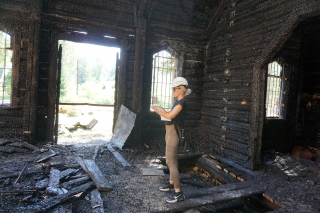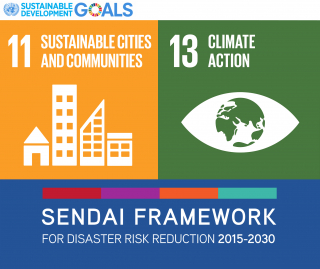ABOUT THE COURSE
Online Workshop
Start date: 15 November 2021
End date: 19 November 2021
Follow-up projects - implementation by the participants
Start Date: 25 November 2021
End Date: 30 May 2022
Online Conference
October 2022 (dates to be confirmed)
Working language
English
Registration fee
None
ORGANIZERS
- ICCROM
- Estonian National Heritage Board
- Estonian Rescue Board
- Estonian Police and Boarder Guard Board
- Italian National Fire Corps (Corpo Nazionale dei Vigili del Fuoco - CNVVF)
- Swedish National Heritage Board
WHY THIS COURSE
National Museum, Brazil. Notre Dame, Paris. Shuri Castle, Japan. Table Mountain, South Africa.
Invaluable heritage resources get destroyed in catastrophic fires every year. In most cases, they are highly preventable. In order to develop tailored solutions, it is important to better understand the nature of fire risk for heritage and work with relevant stakeholders.
PREVENT – Mitigating Fire Risk for Heritage, is a participatory and multidisciplinary learning opportunity that looks at all sources of fire, both natural and manmade. It is based on workshops and field surveys carried out by ICCROM and its partner organizations, and will be led by fire risk prevention specialists, cultural first aiders, firefighters and emergency response agencies.
This five day workshop is being organized within the framework of First Aid and Resilience in Times of Crisis, a flagship programme of ICCROM.
This training initiative seeks the implementation of the United Nations Sustainable Development Goals (SDGs) for partners and participants – SDG 11 and SDG 13. Furthermore, it aims to implement the four priorities for action outlined in the Sendai Framework for Disaster Risk Reduction (SFDRR) 2015 - 2030.
WHAT WILL YOU LEARN?
This workshop focuses on developing solutions for fire risk mitigation by involving heritage professionals, local fire fighters and emergency response agencies. By participating in this course, fire fighters and risk reduction specialists will enhance their knowledge and skills for managing fire risk to heritage places, while heritage professionals will be able to better understand the fire risk and probable impacts on heritage.
By the end of the training initiative, participants will be able to:
- identify and assess fire risks and develop risk scenarios;
- communicate with key stakeholders, such as fire risk prevention specialists, fire fighters, civil protection, volunteers and insurance companies in their respective local contexts, in coordination with professionals from the cultural heritage sector;
- mitigate fire risk and enhance preparedness, as well as mitigation measures in dealing with cultural heritage;
- provide coordinated, time-sensitive and context-specific response;
- engage communities in mapping fire risks and identifying their traditional knowledge on fire prevention and materials;
- identify preventive solutions for fire safety with small impact of culture heritage; and,
- understand the use of new technologies for fire suppression and safety.
WHO CAN PARTICIPATE?
This course offers a unique collaborative learning opportunity and is open to heritage professionals, fire risk prevention specialists, fire fighters, civil protection personnel, volunteers and those working in the insurance sector.
Participants will be composed of a mixed group of heritage professionals, who are highly motivated and accompanied by a representative of their local fire prevention agency, civil protection or any of the other key stakeholders.
Applicants who have prior experience of reducing fire risk or responding to fire at heritage places, will be prioritized.
APPLICATION
In order to apply, each candidate must propose a heritage institution or site for which she/he would like to improve fire risk mitigation and preparedness. Furthermore, in order to strengthen their candidature, they should encourage a representative from their local fire risk prevention, civil protection and emergency response agencies, to apply with them.
To apply, please fill the online application form.
For further information, please contact: far_programme@iccrom.org




